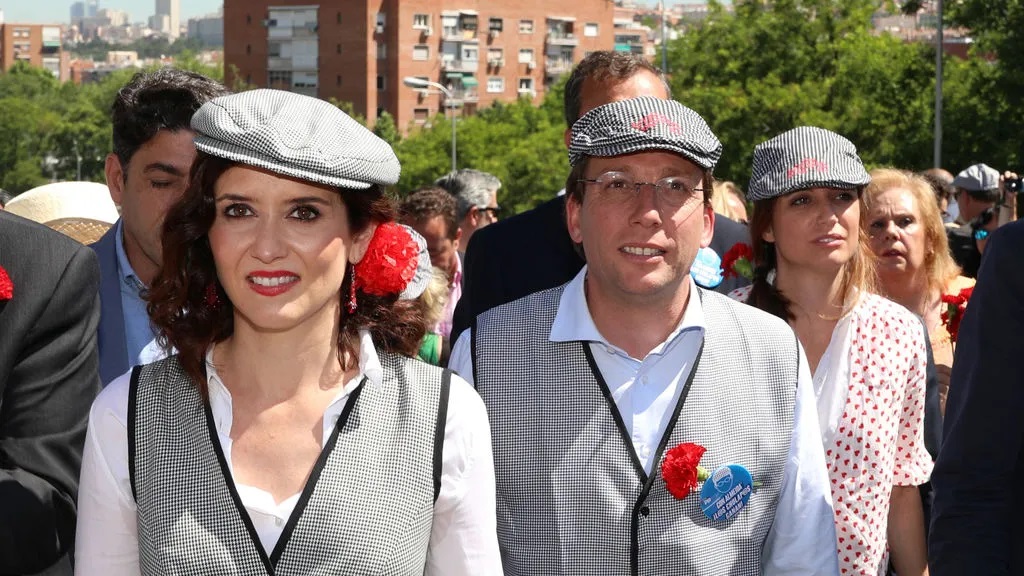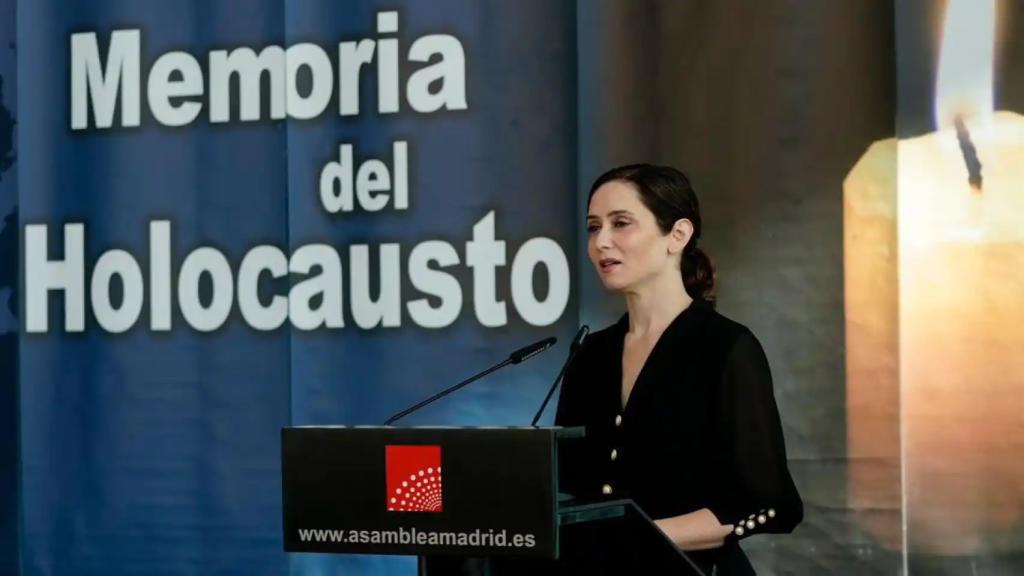Self-styled patron saint and saviour of Madrid, Isabel Díaz Ayuso seems to have the Midas touch. But how far can she go? In the second of three opinion pieces, Michael Bunn looks at the controversial President of the Community of Madrid.
Pity the poor historian. Just imagine having the task, at some point in the future, of trying to make sense of the past decade. And here in Spain, a country that will soon be stricken by desertification, drought and all its attendant problems, I wonder how a Spanish historian will attempt to explain the municipal elections of 28 May, which saw a significant swing towards the right-wing People’s Party (PP), a group that scarcely bothers to hide its scepticism towards climate change.
Perhaps, after some head scratching, our historian will decide to start off with Isabel Díaz Ayuso, president of the Community of Madrid, she being one of the most recognisable faces in the PP and someone whose enduring popularity is as hard to fathom as so many other things in Spain’s current political panorama.
No one would call Ayuso a conventional politician: neither her supporters, who adore her for being a spontaneous, plain-speaking Everywoman, nor her detractors, who criticise her obsessive self-promotion via the media and, worst of all, her intermittently articulate, often vacuous statements to the press.
Because while few politicians enjoy finding themselves in the middle of a scrum of reporters firing off awkward questions, for Ayuso the experience is particularly excruciating.
Her customary good-natured smile evaporates, her face takes on a hunted look and one hand flies to her ear where, beneath her fashionably shaggy mane of hair, she has (political commentators have revealed) an electronic earpiece relaying instructions from her advisers on how to field the reporters’ questions. Though unfortunately for her advisers, all too often their prompts arrive too late: she has already delivered her reply, and the result is rarely opportune, often toe-curling. Here are a few examples.
When questioned on her tax cuts, designed to attract investors but which ended up having a detrimental effect on Madrid’s public service funding, she replied: ‘People come to Madrid because they don’t want to be subsidised.’
Meanwhile, in response to accusations that she had lifted Covid restrictions on Madrid’s shops and bars too soon, and that this had caused a rise in fatalities, she declared: ‘More people die from road accidents, and yet no-one suggests we should tell people to stop driving their cars.’
But one comment that must have had her advisers, at the other end of the Wi-Fi connection, clutching their heads in their hands, was: ‘When people call you a fascist, you know you’re doing the right thing. That you’re on the right side of history.’
Even so, while these Ayusadas (there are entire websites devoted to them) tend to earn her public derision and even contempt, there are many people who think otherwise; I’ll come back to them further on.
As for her claim to be on the right side of history, that is a vain hope. History will not be kind to Ayuso, principally for what happened in summer 2020, when the Covid crisis was at its height. Scores of elderly people in care homes had tested positive for the virus and health officials urged Ayuso to transfer them to hospitals for treatment. Ayuso refused, and the disease spread unchecked through Madrid’s geriatric homes, killing over 7,300 elderly people. A dozen senior health officials resigned in protest.
Meanwhile her drastic tax cuts, causing a shortfall in public funding, led to on-going mass protests by teachers and health workers who accuse her of running the education and health system into the ground with the intention of privatising both areas.

It is true that her political ideas are standard ones, lifted straight from the neoliberal playbook: she espouses cutting taxes and privatising public services, all the while championing vote-winning abstractions such as freedom and progress. When questioned on any of these points she will reply with her standard non sequitur – that everything she does is in response to the actions of Prime Minister Pedro Sánchez, who, she claims is ‘destroying Spain’.
And yet she has just won a third term in office, once again significantly increasing her majority. How can this be? How can a political leader be so demonstrably inept, with so little talent for public speaking (and an apparently endless amount for causing social unrest and public service chaos), and yet still retain her popularity?
Her first year in office was a difficult one; she stood as a relative unknown and won the 2019 elections with a reduced majority after Cristina Cifuentes, the previous president, was forced to stand down after having been implicated in the corruption scandals devastating the PP. Ayuso’s lack of experience and even competence began to reveal itself, battered as she was on one side by Ángel Gabilondo, the urbane, experienced PSOE opposition leader, and manipulated on the other by Ciudadanos (Cs), the party with whom she had been forced into a coalition. Then came the turning point in Ayuso’s career: in January 2020 she took on Miguel Ángel Rodríguez as her adviser.

Rodríguez had previously been spin doctor to former Prime Minister José Maria Aznar and was held in high esteem throughout the PP as a master political strategist and media wizard. For him, Ayuso represented the perfect raw material to allow him to do something very different – to create a political persona that would extend beyond politics and hopefully catch the imagination in Madrid and perhaps beyond.
Rodríguez had taken note of what was happening on the other side of the Atlantic, and he freely borrowed ideas from Donald Trump to rebrand his new protégé. Under his guidance, she was suddenly everywhere on the media, giving her scattergun opinions on a myriad of topics.
The arrival of Covid then gave her the perfect platform as a champion of freedom for her beloved Madrid citizens. With Rodríguez feeding her the soundbites, she began chipping away at the official lockdown restrictions. Without consulting the government, she created a ‘Covid card’ that would give more freedom of movement to those vaccinated in Madrid. Next, she divided the city up into different levels of lockdown according to the severity of contagion in each area. Inevitably it was the poorer, more crowded neighbourhoods that had the highest Covid figures, and so were subjected to the strictest lockdown conditions.
Left-wing commentators barely had a chance to open their mouths to protest at what they saw as Ayuso’s classism before she gleefully poured more fuel onto the fire, declaring that Covid was particularly prevalent in the city’s poorer districts ‘because of the way of life of our immigrant population in Madrid’. This brought further furious attacks from the left, but they only helped to cement Ayuso’s position as a right-wing figurehead in the culture wars, which were just beginning to appear in the newspapers and Twitter timelines, and with Ayuso always placed centre-stage.
Another huge advantage for Rodríguez in his work as Ayuso’s Svengali is that she is a young, attractive woman, and he exploited this prime marketing feature to the utmost. She began to appear in fashion and lifestyle magazines almost as often as in the political media. Her dress sense was scrutinised on afternoon TV programmes, and she embarked on a much-publicised fitness regime to lose weight and do justice to the many different outfits she was photographed in.

Ayuso had succeeded in straddling the divide between politics and celebrity, and people loved her for it. Veronica Fumanal, head of the Association for Political Communication, describes her as ‘a young woman who is relaxed, natural and spontaneous. She says things that are politically incorrect, and that makes her seem genuine. She connects with people’.
Political analyst Anton Losada says: ‘Many people see Ayuso as being just like them. She has developed a persona based on the idea of “I’m not political” … even though she has spent her entire working career in a political party.’
As for her awkward, occasionally fatuous style of public speaking, Losada recalls the campaign battle between Al Gore and George Bush before the 2000 elections, from which Bush emerged the winner. ‘The liberal press criticised Bush for the clumsy way he expressed himself, his difficulty in finishing his sentences. But each time the press criticised him, his public support grew even more … People reacted against what they saw as the classic elitist prejudice of mocking others for not being as educated as they are.’
Losada sees a parallel with Ayuso: ‘She presents herself as being anti-politics, just an ordinary girl from Madrid. The more she’s criticised for that, the more she connects with people.’

Thus Ayuso’s weakness, her awkwardness as a public speaker, has become her strength, since many people find her frequent Ayusadas and outrageous outbursts entertaining and even endearing. In fact, when Pope Francis made a public apology to Mexico in 2021 for the sins of the Catholic Church during the Spanish Conquest and Ayuso responded with barely-concealed irritation (after all, she argued, Spain had brought Catholicism and civilisation to the country, so the Mexicans ought to be grateful), she received hardly any public backlash in Spain, a nation that is traditionally Catholic.
This was a hugely significant exchange for Ayuso: when you can go up against the head of the Church, a holy, infallible being, and come away unscathed by the media, then you know you’re pretty special.
Despite her minor run-in with the Pope (they made it up later when she was granted a highly-mediatised audience with His Holiness), tradition – and specifically Spanish tradition – plays a crucial part in Ayuso’s constructed persona, and she exploits it to the full to maintain her media profile and stay in the news.
She appeared at Las Ventas, Madrid’s venerable bullring, wearing an outfit evoking the bullfighter’s traje de luces (‘suit of lights’). For Easter Week in Seville she dressed demurely in black with a lace mantilla, and in that same week she appeared on the front page of a newspaper in a Madonna-like pose, all in black, wearing an anguished expression and with her hands crossed over her chest, purportedly in mourning for the shops and bars forced to close due to Covid restrictions.

And of course by upholding tradition, Ayuso is availing herself of the old PP fetish of yesterday’s Spain, the old days. While she stops short of declaring that life was better under Franco, the inference is there: that this traditionally inward- and backward-looking country should not stray too far from its ancestral values.
Such evocations of past times are politically very useful in that they bring feelings of security, just as thoughts of the future can provoke unease. The careers of Isabel Díaz Ayuso and Ada Colau in Barcelona could be contrasted in this way – Colau has always tried to make people open their eyes to the threat of climate change, while Ayuso, with her repeated extolling of Madrid’s street life, bustling with families, children and noisy bars filled with friends having fun, encourages people to look back fondly to simpler pleasures, simpler times. It’s the latter message that has proved to be the vote-winner.
Meanwhile, Miguel Ángel Rodríguez continues to mastermind her progress. When he first took on the project of forging what he calls the ‘Ayuso style’, he revealed that he had hopes of taking her all the way to the top of Spanish politics, to become prime minister, though he might think differently now. The problem is that with the script he has created for the concept of ‘Ayuso style’, which focuses almost exclusively on Madrid, he may well have stymied any hopes of political advancement for his protégé.
Ayuso’s message is strictly confined within Madrid’s city limits; she tirelessly lauds the city as a kind of über Spain that deserves superior treatment to the rest of the nation. In one of her anti-lockdown declarations, she said: ‘In my opinion, it’s very unfair to treat Madrid just like the other comunidades [regions of Spain].’

Furthermore, she has made a number of disparaging remarks about other parts of Spain, even expressing pity for them that they are not Madrid. This will come back to haunt her if she tries to expand her ambitions to national politics. Spaniards are famously proud of their regional origins, and they are not likely to forget her comments.
Another factor that suggests that she is not built for high political office is that her Ayusadas, while benignly indulged in her home city, can go a little too far in her desire to monopolise the news headlines, to the point that they are sometimes openly offensive. Last January, on Holocaust Memorial Day, she shocked a press briefing by making an unfortunate comparison between the origins of the Holocaust and (the inference was) the actions of the Spanish government.
‘The Shoa didn’t begin with the Final Solution,’ she said. ‘It began with finger-pointing, criminalisation, dehumanisation and discrimination … encouraged by government authorities and using public resources … also in Spain, in state schools, neighbours’ groups, certain streets and squares.’

Ayuso frequently lambasts Pedro Sánchez to the media in a way that suggests that she sees him as her rival (no doubt to the discomfort of Alberto Núñez Feijóo, the rather uncharismatic leader of the PP). But the fact is, Rodríguez and Ayuso have painted themselves into a Madrid-centric corner, and any hopes she might have of one day contesting the Spanish general elections seem little more than an idle pipedream, something well beyond the grasp of someone like her: just a normal girl from Madrid.
ALSO READ: Opinion: three women in Spanish politics – No.1 Ada Colau: agent of change.

Based in Barcelona, Michael Bunn is a British journalist and translator who has lived, worked and travelled all over Europe, SE Asia and the Far East.
If you’d like to contribute to our ‘Opinion, Blogs & Spanish Experiences’ section, please email us: editorial@spainenglish.com. We’d love to hear from you.
Sign up for the FREE Weekly Newsletter from Spain in English.
Please support Spain in English with a donation.
Click here to get your business activity or services listed on our DIRECTORY.



